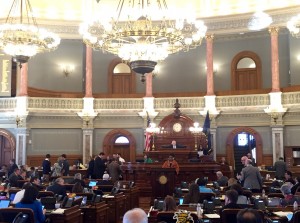By John Celock
Kansas budget writers moved forward with an action to create a task force to study efficiencies within the state’s education system.
The state House Appropriations Committee voted Thursday to create the task force that will review school efficiencies with a focus on procurement reform. The move comes a year after the state House of Representatives rejected a proposal to require school districts to use the state procurement pool for purchases, a move recommended in a government efficiency study commissioned by lawmakers in 2015. The task force is tucked in to a budget draft that the committee approved on Thursday.
“I think there is room. If they study it and say there is no way to move forward they will have to support it,” House K-12 Education Budget Committee Chairman Larry Campbell (R-Olathe) said of the task force. “I think there are always ways to save money.”
Campbell said that the task force was needed quickly in order to allow for the study to be conducted and recommendations to be received by state education officials and lawmakers. He noted that the Legislature has waited over a year since the efficiency study recommendations were received last January.
Campbell said that the task force would be comprised of state legislators, industry experts and school district officials, with legislative leaders and the state Department of Administration making the decisions on who would serve. Membership on the task force caused much debate in the committee.
Rep. Tom Burroughs (D-Kansas City) said that he did not want to see too many representatives from private industry on the task force. He said he did not know if they would have an interest in the issue. Appropriations Committee Vice Chairwoman Erin Davis (R-Olathe) said that she did not have an issue with private industry coming in.
“If private industry comes in with good ideas we should not be opposed to good ideas no matter where they come from,” Davis said.
Committee members then noted that the task force would include a representative of the Wichita school system on it automatically but no other district. Campbell said that was done since Wichita was known for efficiencies in procurement and as the largest school system in the state.
During discussion of an amendment to add a member of the state Board of Education to the task force, lawmakers started discussing adding in school officials from Johnson County and Kansas City to the task force. This discussion led to conversations about ensuring geographic diversity on the task force and then the need to include western Kansas members and rural members.
Rep. J.R. Claeys (R-Salina) questioned the debate over geography and who will serve, noting that lawmakers had not defined western Kansas or rural. He said that in the debate on whether to include Kansas City and Johnson County members, along with rural members, other cities like Salina, Hutchinson and Dodge City were being ignored.
“The midsize cities tend to get overlooked,” Claeys said. “We’re micromanaging this task force and getting in the weeds.”
Campbell said that Wichita needed to be included.
“Wichita is on here because they have their procurement process down and whatever we do on health care will affect them,” he said. “They definitely need to be at the table.”

